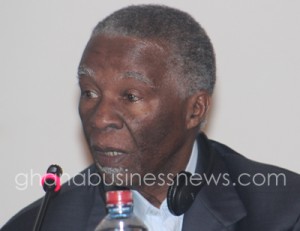Stopping illicit flows can help Africa bridge infrastructure gap – Thabo Mbeki

Former President Thabo Mbeki of South Africa on Tuesday concluded the last in the series of regional consultative meetings on illicit financial flows (IFFs) in Africa.
He said the ability to stop IFFs would allow Africa to address its development challenges, adding that IFFs was an African problem with a global solution.
He said Africa would greatly benefit from being able to retain financial flows that illicitly evade the continent each year and were estimated at a staggering $50 billion annually between 2000 and 2008. “Being able to stem IFFs would for instance help Africa bridge the infrastructure gap and address its huge development challenges.”
President Mbeki was addressing delegates from West and Central Africa who took part in a regional consultation held in Accra by the High Level Panel (HLP) on IFFs, of which he is the Chairman.
The 100 delegates were drawn from civil society organizations, the judiciary, security agencies, banks and financial institutions, governmental agencies, among others.
He said Africa had lost more than $850 billion in IFFs since the early 1970s with the funds ending up mainly in developed and emerging economies. declaring that the financial loss had had detrimental effects on African countries, making them unable to garner the domestic resources needed to address their development needs.
While IFFs came from Africa, President Mbeki stressed that a global coalition was needed to efficiently deal with the issue. “IFFs is an African problem with a global solution. Solutions need to be found at the origin and destinations of funds.”
President Mbeki said applying international instruments such as international conventions on transparency or corruption would constitute good first steps, however, setting up an African and global coalition would lead to better results.
He assured delegates that the final report of the Accra meeting would be ready by mid 2014.
Dr Abdallah Hamdock, Deputy Executive Secretary of the United Nations Economic Commission for Africa, called for concrete proposals to address the problem of IFFs in Africa.
The West and Central Africa Regional Consultations are the last of a round of such regional consultations, which took the HLP to Nairobi for the East Africa Region, Lusaka for the Southern Africa Region and Tunis for North Africa.
The HLP also consulted stakeholders in Algeria, the Democratic Republic of Congo, Mozambique and Nigeria.
In addition to sensitizing stakeholders about the importance of stemming IFFs from Africa, the different consultations have allowed the HLP to better understand the scale, manifestations and drivers of IFFs across the continent.
The HLP was established by the Joint African Union Economic Commission for Africa Conference of Ministers of Finance, Planning and Economic Development and inaugurated in February 2012 in Johannesburg. The Panel’s mandate is to address the debilitating problem of IFFs estimated at $50 billion a year.
Source: GNA
